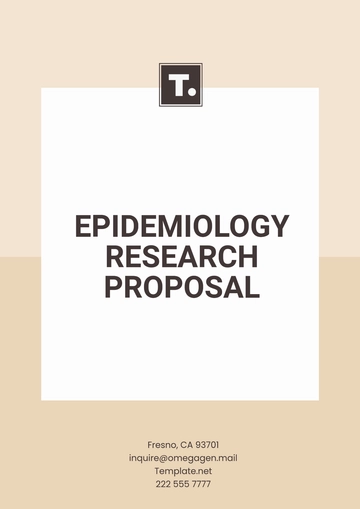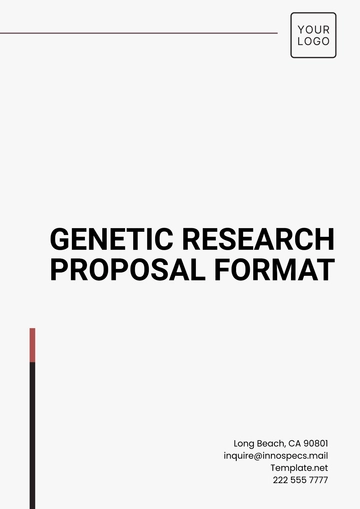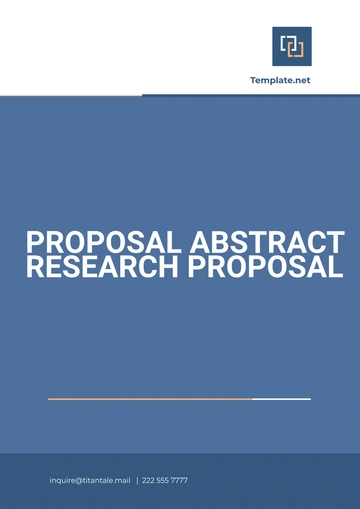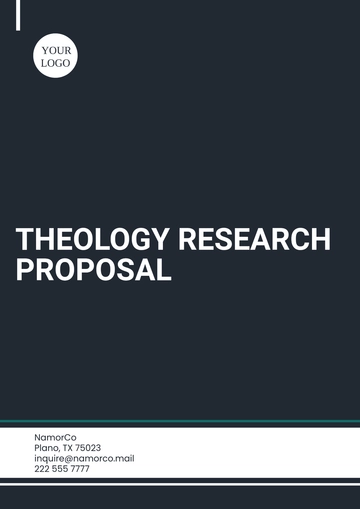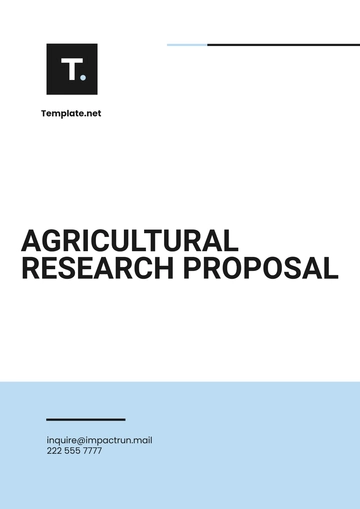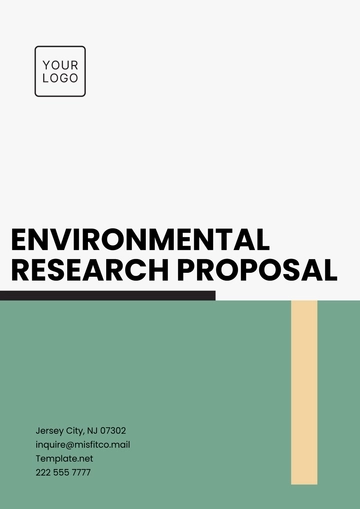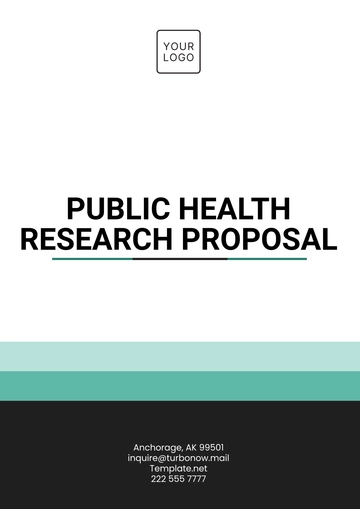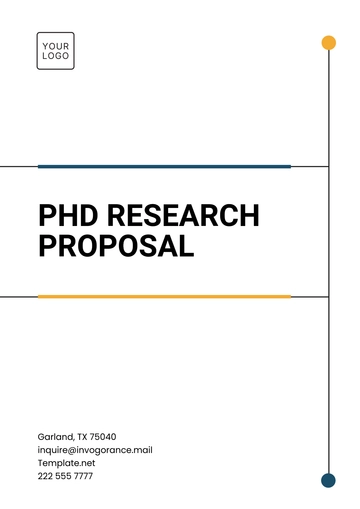Free Policy Research Proposal Report

Address: [YOUR COMPANY ADDRESS]
Department: Policy and Research Department
Date: October 4, 2061
I. Abstract
This research proposal aims to explore the effectiveness of various policy interventions in reducing carbon emissions in urban areas. The study will analyze current emission levels, evaluate existing policies, and propose new, evidence-based policy measures. The outcomes of this research will provide actionable recommendations for policymakers and urban planners to mitigate environmental impacts and improve air quality in cities.
II. Introduction
Urban areas are significant contributors to global carbon emissions, primarily due to high levels of industrial activity, transportation, and residential energy consumption. With growing urbanization, the need to implement effective carbon reduction strategies has become more critical. This research aims to address this issue by investigating current policies, identifying gaps, and proposing viable solutions.
III. Research Objectives
To assess current carbon emission levels in selected urban areas.
To evaluate the effectiveness of existing policies aimed at reducing carbon emissions.
To identify best practices and successful case studies from other cities and countries.
To propose new policy interventions based on empirical evidence.
To provide recommendations for sustainable urban planning and development.
IV. Literature Review
A comprehensive review of existing literature will be conducted to provide a theoretical foundation for the research. Sources will include academic journals, government reports, and publications from environmental organizations. The literature review will focus on the following areas:
Current state of carbon emissions in urban settings.
Existing policies and their impacts.
Technological advancements in reducing carbon emissions.
Case studies of successful carbon reduction initiatives.
V. Methodology
The research will employ a mixed-methods approach, combining both qualitative and quantitative data. The primary methods will include:
Data Collection: Gathering data from government databases, environmental agencies, and public records.
Surveys: Conducting surveys with policymakers, urban planners, and residents to understand the challenges and impacts of current policies.
Interviews: In-depth interviews with experts in environmental science, urban planning, and policy-making.
Case Studies: Analysis of successful carbon reduction policies in other cities and countries.
VI. Data Analysis
The collected data will be analyzed using statistical software to identify trends, patterns, and correlations. Qualitative data from interviews and surveys will be thematically analyzed. The findings will be used to evaluate the strengths and weaknesses of existing policies and to develop new policy recommendations.
VII. Expected Outcomes
A detailed assessment of current carbon emission levels in the chosen urban areas.
A critical evaluation of the effectiveness of existing policies.
Identification of best practices and successful case studies.
New policy recommendations for reducing carbon emissions.
Guidelines for sustainable urban planning and development.
VIII. Conclusion and References
A. Conclusion
This research aims to provide valuable insights into the effectiveness of current carbon reduction policies and propose new, evidence-based interventions. The findings will be instrumental for policymakers, urban planners, and environmental organizations in making informed decisions to mitigate the impact of carbon emissions in urban areas.
B. References
American Psychological Association. (2060). Publication Manual of the American Psychological Association (7th ed.).
Smith, J. (2058). Urban Planning and Environmental Policy. Journal of Sustainable Urban Development, 15(3), 210-223.
Doe, J., & Roe, R. (2059). Reducing Carbon Emissions: Case Studies from European Cities. Environmental Policy Review, 12(4), 135-160.
United Nations. (2061). World Urbanization Prospects: The 2061 Revision. Retrieved from https://www.un.org.
- 100% Customizable, free editor
- Access 1 Million+ Templates, photo’s & graphics
- Download or share as a template
- Click and replace photos, graphics, text, backgrounds
- Resize, crop, AI write & more
- Access advanced editor
Present your policy research proposals with confidence using the Policy Research Proposal Report Template that’s found on Template.net. This customizable template offers a professional layout for detailing research objectives, methodologies, and expected outcomes. Editable in our intuitive AI Editor Tool, it allows for easy customization to suit your specific needs.
You may also like
- Business Proposal
- Research Proposal
- Proposal Request
- Project Proposal
- Grant Proposal
- Photography Proposal
- Job Proposal
- Budget Proposal
- Marketing Proposal
- Branding Proposal
- Advertising Proposal
- Sales Proposal
- Startup Proposal
- Event Proposal
- Creative Proposal
- Restaurant Proposal
- Blank Proposal
- One Page Proposal
- Proposal Report
- IT Proposal
- Non Profit Proposal
- Training Proposal
- Construction Proposal
- School Proposal
- Cleaning Proposal
- Contract Proposal
- HR Proposal
- Travel Agency Proposal
- Small Business Proposal
- Investment Proposal
- Bid Proposal
- Retail Business Proposal
- Sponsorship Proposal
- Academic Proposal
- Partnership Proposal
- Work Proposal
- Agency Proposal
- University Proposal
- Accounting Proposal
- Real Estate Proposal
- Hotel Proposal
- Product Proposal
- Advertising Agency Proposal
- Development Proposal
- Loan Proposal
- Website Proposal
- Nursing Home Proposal
- Financial Proposal
- Salon Proposal
- Freelancer Proposal
- Funding Proposal
- Work from Home Proposal
- Company Proposal
- Consulting Proposal
- Educational Proposal
- Construction Bid Proposal
- Interior Design Proposal
- New Product Proposal
- Sports Proposal
- Corporate Proposal
- Food Proposal
- Property Proposal
- Maintenance Proposal
- Purchase Proposal
- Rental Proposal
- Recruitment Proposal
- Social Media Proposal
- Travel Proposal
- Trip Proposal
- Software Proposal
- Conference Proposal
- Graphic Design Proposal
- Law Firm Proposal
- Medical Proposal
- Music Proposal
- Pricing Proposal
- SEO Proposal
- Strategy Proposal
- Technical Proposal
- Coaching Proposal
- Ecommerce Proposal
- Fundraising Proposal
- Landscaping Proposal
- Charity Proposal
- Contractor Proposal
- Exhibition Proposal
- Art Proposal
- Mobile Proposal
- Equipment Proposal
- Student Proposal
- Engineering Proposal
- Business Proposal








